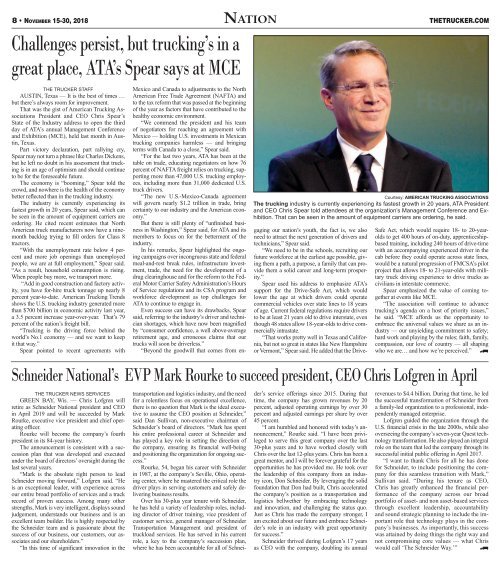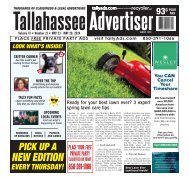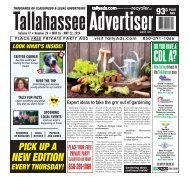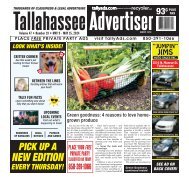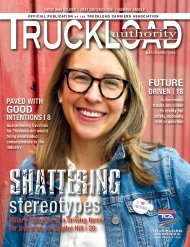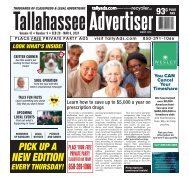The Trucker Newspaper - November 15, 2018
Create successful ePaper yourself
Turn your PDF publications into a flip-book with our unique Google optimized e-Paper software.
8 • <strong>November</strong> <strong>15</strong>-30, <strong>2018</strong> Nation<br />
Challenges persist, but trucking’s in a<br />
great place, ATA’s Spear says at MCE<br />
THE TRUCKER STAFF<br />
AUSTIN, Texas — It is the best of times …<br />
but there’s always room for improvement.<br />
That was the gist of American Trucking Associations<br />
President and CEO Chris Spear’s<br />
State of the Industry address to open the third<br />
day of ATA’s annual Management Conference<br />
and Exhibition (MCE), held last month in Austin,<br />
Texas.<br />
Part victory declaration, part rallying cry,<br />
Spear may not turn a phrase like Charles Dickens,<br />
but he left no doubt in his assessment that trucking<br />
is in an age of optimism and should continue<br />
to be for the foreseeable future.<br />
<strong>The</strong> economy is “booming,” Spear told the<br />
crowd, and nowhere is the health of the economy<br />
better reflected than in the trucking industry.<br />
<strong>The</strong> industry is currently experiencing its<br />
fastest growth in 20 years, Spear said, which can<br />
be seen in the amount of equipment carriers are<br />
ordering. He cited recent estimates that North<br />
American truck manufacturers now have a ninemonth<br />
backlog trying to fill orders for Class 8<br />
tractors.<br />
“With the unemployment rate below 4 percent<br />
and more job openings than unemployed<br />
people, we are at full employment,” Spear said.<br />
“As a result, household consumption is rising.<br />
When people buy more, we transport more.<br />
“Add in good construction and factory activity,<br />
you have for-hire truck tonnage up nearly 8<br />
percent year-to-date. American Trucking Trends<br />
shows the U.S. trucking industry generated more<br />
than $700 billion in economic activity last year,<br />
a 3.5 percent increase year-over-year. That’s 79<br />
percent of the nation’s freight bill.<br />
“Trucking is the driving force behind the<br />
world’s No.1 economy — and we want to keep<br />
it that way.”<br />
Spear pointed to recent agreements with<br />
THE TRUCKER NEWS SERVICES<br />
GREEN BAY, Wis. — Chris Lofgren will<br />
retire as Schneider National president and CEO<br />
in April 2019 and will be succeeded by Mark<br />
Rourke, executive vice president and chief operating<br />
officer.<br />
Rourke will become the company’s fourth<br />
president in its 84-year history.<br />
<strong>The</strong> announcement is consistent with a succession<br />
plan that was developed and executed<br />
under the board of directors’ oversight during the<br />
last several years.<br />
“Mark is the absolute right person to lead<br />
Schneider moving forward,” Lofgren said. “He<br />
is an exceptional leader, with experience across<br />
our entire broad portfolio of services and a track<br />
record of proven success. Among many other<br />
strengths, Mark is very intelligent, displays sound<br />
judgement, understands our business and is an<br />
excellent team builder. He is highly respected by<br />
the Schneider team and is passionate about the<br />
success of our business, our customers, our associates<br />
and our shareholders.”<br />
“In this time of significant innovation in the<br />
transportation and logistics industry, and the need<br />
for a relentless focus on operational excellence,<br />
there is no question that Mark is the ideal executive<br />
to assume the CEO position at Schneider,”<br />
said Dan Sullivan, non-executive chairman of<br />
Schneider’s board of directors. “Mark has spent<br />
his entire professional career at Schneider and<br />
has played a key role in setting the direction of<br />
the company, ensuring its financial well-being<br />
and positioning the organization for ongoing success.”<br />
Rourke, 54, began his career with Schneider<br />
in 1987, at the company’s Seville, Ohio, operating<br />
center, where he mastered the critical role the<br />
driver plays in serving customers and safely delivering<br />
business results.<br />
Over his 30-plus year tenure with Schneider,<br />
he has held a variety of leadership roles, including<br />
director of driver training, vice president of<br />
customer service, general manager of Schneider<br />
Transportation Management and president of<br />
truckload services. He has served in his current<br />
role, a key to the company’s succession plan,<br />
where he has been accountable for all of Schneider’s<br />
service offerings since 20<strong>15</strong>. During that<br />
time, the company has grown revenues by 20<br />
percent, adjusted operating earnings by over 30<br />
percent and adjusted earnings per share by over<br />
45 percent.<br />
“I am humbled and honored with today’s announcement,”<br />
Rourke said. “I have been privileged<br />
to serve this great company over the last<br />
30-plus years and to have worked closely with<br />
Chris over the last 12-plus years. Chris has been a<br />
great mentor, and I will be forever grateful for the<br />
opportunities he has provided me. He took over<br />
the leadership of this company from an industry<br />
icon, Don Schneider. By leveraging the solid<br />
foundation that Don had built, Chris accelerated<br />
the company’s position as a transportation and<br />
logistics bellwether by embracing technology<br />
and innovation, and challenging the status quo.<br />
Just as Chris has made the company stronger, I<br />
am excited about our future and embrace Schneider’s<br />
role in an industry with great opportunity<br />
for success.”<br />
Schneider thrived during Lofgren’s 17 years<br />
as CEO with the company, doubling its annual<br />
THETRUCKER.COM<br />
Courtesy: AMERICAN TRUCKING ASSOCIATIONS<br />
<strong>The</strong> trucking industry is currently experiencing its fastest growth in 20 years, ATA President<br />
and CEO Chris Spear told attendees at the organization’s Management Conference and Exhibition.<br />
That can be seen in the amount of equipment carriers are ordering, he said.<br />
Mexico and Canada to adjustments to the North<br />
American Free Trade Agreement (NAFTA) and<br />
to the tax reform that was passed at the beginning<br />
of the year as factors that have contributed to the<br />
healthy economic environment.<br />
“We commend the president and his team<br />
of negotiators for reaching an agreement with<br />
Mexico — holding U.S. investments in Mexican<br />
trucking companies harmless — and bringing<br />
terms with Canada to a close,” Spear said.<br />
“For the last two years, ATA has been at the<br />
table on trade, educating negotiators on how 76<br />
percent of NAFTA freight relies on trucking, supporting<br />
more than 47,000 U.S. trucking employees,<br />
including more than 31,000 dedicated U.S.<br />
truck drivers.<br />
“<strong>The</strong> new U.S.-Mexico-Canada agreement<br />
will govern nearly $1.2 trillion in trade, bring<br />
certainty to our industry and the American economy.”<br />
But there is still plenty of “unfinished business<br />
in Washington,” Spear said, for ATA and its<br />
members to focus on for the betterment of the<br />
industry.<br />
In his remarks, Spear highlighted the ongoing<br />
campaigns over incongruous state and federal<br />
meal-and-rest break rules, infrastructure investment,<br />
trade, the need for the development of a<br />
drug clearinghouse and for the reform to the Federal<br />
Motor Carrier Safety Administration’s Hours<br />
of Service regulations and its CSA program and<br />
workforce development as top challenges for<br />
ATA to continue to engage in.<br />
Even success can have its drawbacks, Spear<br />
said, referring to the industry’s driver and technician<br />
shortages, which have now been magnified<br />
by “consumer confidence, a well above-average<br />
retirement age, and erroneous claims that our<br />
trucks will soon be driverless.”<br />
“Beyond the goodwill that comes from engaging<br />
our nation’s youth, the fact is, we also<br />
need to attract the next generation of drivers and<br />
technicians,” Spear said.<br />
“We need to be in the schools, recruiting our<br />
future workforce at the earliest age possible, giving<br />
them a path, a purpose, a family that can provide<br />
them a solid career and long-term prosperity.”<br />
Spear used his address to emphasize ATA’s<br />
support for the Drive-Safe Act, which would<br />
lower the age at which drivers could operate<br />
commercial vehicles over state lines to 18 years<br />
of age. Current federal regulations require drivers<br />
to be at least 21 years old to drive interstate, even<br />
though 48 states allow 18-year-olds to drive commercially<br />
intrastate.<br />
“That works pretty well in Texas and California,<br />
but not so great in states like New Hampshire<br />
or Vermont,” Spear said. He added that the Drive-<br />
Safe Act, which would require 18- to 20-yearolds<br />
to get 400 hours of on-duty, apprenticeshipbased<br />
training, including 240 hours of drive-time<br />
with an accompanying experienced driver in the<br />
cab before they could operate across state lines,<br />
would be a natural progression of FMCSA’s pilot<br />
project that allows 18- to 21-year-olds with military<br />
truck driving experience to drive trucks as<br />
civilians in interstate commerce.<br />
Spear emphasized the value of coming together<br />
at events like MCE.<br />
“<strong>The</strong> association will continue to advance<br />
trucking’s agenda on a host of priority issues,”<br />
he said. “MCE affords us the opportunity to<br />
embrace the universal values we share as an industry<br />
— our unyielding commitment to safety;<br />
hard work and playing by the rules; faith, family,<br />
compassion, our love of country — all shaping<br />
who we are… and how we’re perceived.” 8<br />
Schneider National’s EVP Mark Rourke to succeed president, CEO Chris Lofgren in April<br />
revenues to $4.4 billion. During that time, he led<br />
the successful transformation of Schneider from<br />
a family-led organization to a professional, independently<br />
managed enterprise.<br />
Lofgren guided the organization through the<br />
U.S. financial crisis in the late 2000s, while also<br />
overseeing the company’s seven-year Quest technology<br />
transformation. He also played an integral<br />
role on the team that led the company through its<br />
successful initial public offering in April 2017.<br />
“I want to thank Chris for all he has done<br />
for Schneider, to include positioning the company<br />
for this seamless transition with Mark,”<br />
Sullivan said. “During his tenure as CEO,<br />
Chris has greatly enhanced the financial performance<br />
of the company across our broad<br />
portfolio of asset- and non asset-based services<br />
through excellent leadership, accountability<br />
and sound strategic planning to include the important<br />
role that technology plays in the company’s<br />
businesses. As importantly, this success<br />
was attained by doing things the right way and<br />
not compromising core values — what Chris<br />
would call ‘<strong>The</strong> Schneider Way.’” 8


